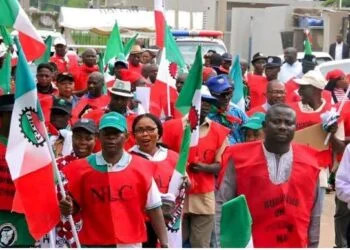The President of the Petroleum and Natural Gas Senior Staff Association of Nigeria, Festus Osifo, has condemned the oil companies for failure to employ qualified Nigerians.
Osifo said the growing trend by companies to employ foreigners, mainly Indians, is contrary to the local content regulations which seek to increase local content participation to 70 per cent by 2027.
He raised the alarm during his address at the union’s National Executive Council meeting, held on Tuesday in Abuja.
He stressed that many companies have abused the expatriates quota outlined by the government, fuelling unrest and resentment among Nigerians who feel excluded from opportunities in their industry.
He said, “A pressing concern is the high number of expatriates in Nigeria’s oil and gas industry, mainly from India. While skilled foreign workers contribute to economic development, the current situation demands attention.
“We have been calling names. We are not shying away from calling names. We called out a company called Indorama and others and the issue was fixed in the past.”
Osifo further called on the Nigerian Content Development and Monitoring Board and the Ministry of Interior to stop granting employment licenses to every foreigner who comes into the country seeking employment.
He added, “We are also holding to account a government institution called Nigerian Content Development and Monitoring Board and the Ministry of Interior, these are the people that give permits for these expatriates to come. If you go to some of these companies, vulcanizers and conductors are Indians.
“Even operators are Indians. And that should not go. So, rising from this NEC meeting, we are going to resolve that we will do everything possible to hold them to account.
“This is not the first company where this has been done. In the company where I work, for example, Total Energy, in 2015, it was a battle. It was war. We took it to them, and we ensured that the expatriate index was greatly reduced. So, we have done it before. We can also do it again. Because the more you send these expatriates away, the more, the management of these companies will open up the system and employ more Nigerians. It is so bad that our institutions are weak.
“The people that fight for the workers in Angola are not even trade unions. They are government institutions. If you work in Angola for a while, you must go back to your country and reapply again.
And they ensure that the jobs that they give you in Angola are those technical jobs. So, our government must sit up. Our institutions must sit up.
“NCDMB, Ministry of Interior, they must sit up and do what they ought to do. So, it is a battle that we are much more prepared to fight. And very, very soon, we will confront it head-on and frontally.”
He also requested clarification on the proposed tax reforms bill, particularly in relation to the revenue collection mandate by the Nigerian Midstream and Downstream Petroleum Regulatory Authority and the Igerian Upstream Petroleum Regulatory Commission.
The association also asked the government to extend the tax exemption level to persons earning N150,000 per month.
“On the issues of tax reform, we are currently examining the bill. So, one of the areas that we have seen in the bill that is quite okay is to give tax relief to people who are around minimum wage. What is there in the bill today is about N800,000 per annum.
“And also, for businesses whose turnover is about 50 million Naira, we found that most of the nano and micro businesses fell within that range of 50 million. So, it’s quite good. But, what we have been advocating is that that N800,000 is too small. The government should expand it to persons earning N100,000 to N150,000 per month. So, we are studying the bill, and we are looking at those provisions that are salient. These are what we will bring up at the public hearing.
“So, when we are done with all these, we will send you a copy of our position as PENGASSAN. And in addition to what I just said, there is also a particular area that we are looking at. Today, we have NMDPRA. We have NUPRC. So, they largely pay our members from the cost of connection. But today, they want to replace that with the Nigerian Revenue Service.
“The service will be collecting revenue across the board, both from the oil and gas and customs. So, we are currently studying that provision. We would still need clarification on these issues. We are asking when these are going to form our proposal to the National Assembly during the public hearing,” he added.
When asked if any workers became unemployed as a result of the recent divestment by international oil companies, the official said, “We can confirm to you that as of today, there is no single job that has been lost in any of these companies as a result of divestment.
“This is because we realise that our primary function is how to safeguard jobs for our members. First, you safeguard jobs, then you start talking about pay enhancement. If the job is not there, you won’t be able to talk about pay enhancement because what are you enhancing? So first, you safeguard the job.
“So in each of the agreements that were signed, it was clearly stated, all our jobs will be safeguarded,” he said.






























